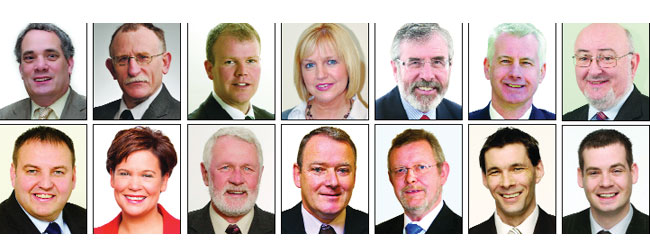4 March 2011
Sinn Féin - setting the agenda
BY CAOILFHIONN
NÍ DHONNABHAIN
WHEN Sinn Féin’s Pearse Doherty succeeded in his High Court bid to force the Government to hold the Donegal South-West by-election, the days of the 30th Dáil were numbered and a general election became inevitable.
It was an election a long time in the coming. The Fianna Fáil/Green Party Government had become increasingly unstable following a number of resignations from the Fianna Fáil parliamentary party and of Fianna Fáil TDs.
Three by-elections needed to be held but no dates had been set. The Donegal South-West by-election was almost 18 months overdue when Pearse Doherty succeeded in his High Court challenge.
The period since Fianna Fáil and the Greens took office in the 2007 had seen a collapse of the economy and of the property sector and a disastrous banking policy that included the blanket bank guarantee. It was also characterised by a growing public intolerance for the excesses of politicians such as John O’Donoghue and Ivor Callely claiming huge expenses from the public purse.
In November, the IMF came to town.
During this period, Sinn Féin provided the most coherent voice of political opposition to the economic direction being set by the Government.
During the general election, it was Sinn Féin that put issues such as the disastrous IMF bank bail-out, the erosion of sovereignty and the punitive Universal Social Charge on the political agenda.
Others were forced to respond to an agenda set by Sinn Féin. The Labour Party and Fianna Fáil in particular increasingly looked over their shoulders at Sinn Féin.
Fianna Fáil’s failed attempt to rebrand itself as a republican party focusing on the working class and small farmers was a transparent attempt to steal Sinn Féin’s political clothes.
In the weeks before the dissolution of the last Dáil Fine Gael and Labour lined up behind Fianna Fáil to help the Government get the Finance Bill which implemented the Budget cuts through the Dáil.
Sinn Féin stood against this agenda to deny citizens their say in relation to the economic future of the state.
Sinn Féin clearly stood out from the ‘Consensus for Cuts’ with Pearse Doherty’s powerful Budget speech setting out the Sinn Féin alternative to cuts and austerity getting almost 40,000 hits on YouTube.
Sinn Féin’s argument that it would not be possible to reduce the deficit to 3% of GDP by 2014 was echoed by many economists and bodies such as ESRI.
The logic of Sinn Féin’s message clearly resonated with many citizens right across the state. The party argued for a 2016 timeframe – a position which came to be adopted by the Labour Party during the course of this campaign when they abandoned their previously-held position that the deficit could be reduced to 3% by 2014.
The Labour Party also flip-flopped on whether it would reverse Budget cuts. Eamon Gilmore, having declared in a Late Late Show interview that he would not reverse cuts introduced in December’s Budget, later attempted to back-track.
The clear political alternative put forward by Sinn Féin exposed the Labour Party’s empty promise of change and put them under pressure, which manifested itself in an increasingly erratic Labour campaign.
Sinn Féin, with an increased electoral mandate, will be setting the agenda in the new Dáil.
The party’s newly-elected TDs have made it clear that they will hold the Government to account and will be standing up for Ireland and for ordinary citizens in the face of IMF/EU interference, austerity budgets and anti-people cuts that will be imposed by the incoming Fine Gael-led government.
Follow us on Facebook
An Phoblacht on Twitter
Uncomfortable Conversations

An initiative for dialogue
for reconciliation
— — — — — — —
Contributions from key figures in the churches, academia and wider civic society as well as senior republican figures





